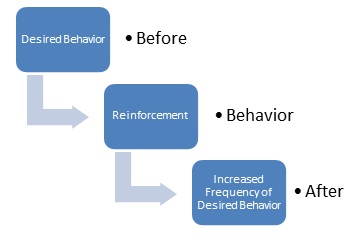- Business Concepts ›
- Human Resources (HR) ›
- Positive Reinforcement
Positive Reinforcement - Definition & Meaning
This article covers meaning & overview of Positive Reinforcement from HRM perspective.
Positive Reinforcement Definition
Positive reinforcement refers to the application or addition of a stimulus (reinforcement) that increases or maintains the probability of some behaviour. The reinforcer is dependent or contingent on the occurrence of some desired behaviour. This means that if you get a reward for a particular behavior, then you are more likely to repeat the same behavior.
Example: When you come to the class on time, you get attendance.
When a salesperson meets his target within the stipulated time, he/she gets commission on the same.
In operant conditioning, there are two types of reinforcement; positive reinforcement and negative reinforcement.
Types of positive reinforcement:
Out of the many ways of encouraging a behavior, a good manager chooses the most appropriate type of reinforcement depending upon the nature of an individual and the prevailing situations in the organization.
• Natural Reinforcers: They occur naturally as a response to a particular behavior.
Example: A student, who studies hard and pays attention in class, gets good marks.
• Token Reinforcers: These are the points awarded for performing specific actions, which can be exchanged for something of value.
Example: When you shop from an online website for a specific number of times, then you get points and you can exchange these points earned for something worth those points.
• Social Reinforcers: It refers to appraising a person socially.
Example: The teacher says, “Excellent work” when the student does something good.
• Tangible Reinforcers: It includes giving a physical reward to an individual to encourage a specific behavior.
Example: The doctor gives candies to kids who don’t cry.

Above diagram shows positive reinforcement
Hence, this concludes the definition of Positive Reinforcement along with its overview.
This article has been researched & authored by the Business Concepts Team which comprises of MBA students, management professionals, and industry experts. It has been reviewed & published by the MBA Skool Team. The content on MBA Skool has been created for educational & academic purpose only.
Browse the definition and meaning of more similar terms. The Management Dictionary covers over 1800 business concepts from 5 categories.
Continue Reading:
What is MBA Skool?About Us
MBA Skool is a Knowledge Resource for Management Students, Aspirants & Professionals.
Business Courses
Quizzes & Skills
Quizzes test your expertise in business and Skill tests evaluate your management traits
Related Content
All Business Sections
Write for Us